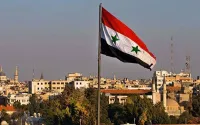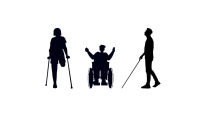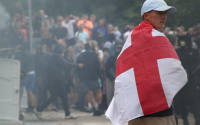"I happened to be there when the US troops told people to start looting."
Mr Bayomi went from Malmo in Sweden to Baghdad as a human shield and arrived the same day that the fighting began. About this he has much to tell, but the most interesting part of his story is his testimony about the looting.
"I had visited some friends that live at a rundown area close to Haifa Avenue on the west side of the Tigris river. It was 8 April and the fighting was so fierce that I could not make it back to the other side of the river. In the afternoon things got very quiet and four American armoured vehicles lined up in the outskirts of the township. From the tanks we heard a call in Arabic that urged the people to approach them.
"During the morning everyone that tried to cross the street had been shot. But in the bizarre silence after all the shooting, people finally got curious. After 45 minutes the first Iraqis dared to approach. Suddenly the soldiers shot the two Sudanese guards that had been posted outside an official building on the other side of Haifa Avenue.
"I was no more than 300 metres away when the guards were murdered. Then they shot the door to the building open and the Arabic-speaking interpreters in the tanks encouraged people to help themselves to the building's contents. The rumour spread quickly, and the building was cleaned out. After that, armored vehicles broke down the door to the building of the Department of Justice next door, and the looting continued.
"I was in a large crowd and we all witnessed what happened. None of us took part in the looting, but did not dare to interfere. Many had tears in their eyes from the feeling of shame. The next morning the looting spread to the modern museum 500 metres further north. Two crowds also gathered there, one looting and one passive, despising this activity."
Are you saying that it was the US troops who initiated the looting?
"Definitely. Because of the lack of scenes of joy, the US troops need pictures of Iraqis that showed their hate for Saddam's regime."
Well, the Iraqis did tear down a large statue of Saddam?
"Did they? It was done by a US tank, and right next to the hotel where all the media live. Until lunchtime on 9 April, I did not see one torn up Saddam image. If people had wanted to destroy statues they could have taken down one of the many smaller statues of Saddam without the help of an American tank. If it was a political uprising people would have turned over statues first and looted after."
Here in Sweden Mr Bayomi holds a doctorate at the University of Lund where he has taught and researched conflicts in the Middle East for ten years. His expertise extends both to actual conflicts and the conduct of propaganda.
Is it not a good thing that Saddam is gone?
"He is not gone. He has dissolved his army into small, small units. That's why there never was any great battle. He practically dissolved the state back in 1992, and he has instead controlled the tribal structure that is the most important in Iraq. When the US started the war, Saddam abandoned the idea of the state completely and relies now totally on the tribal structure. That is the reason why he abandoned the major cities without a fight.
"No, the US is now being forced to do all the work itself because there is no internal political power that wants to challenge the contemporary structure. The two people who came from the outside were lynched immediately."
Mr Bayomi is referring to what happened to General Nazar al-Khazraji, who fled from Denmark, and the Shia Muslim leader, Abdul Majis al-Khoei. They were cut in pieces with swords and stabbed by a furious mob in Najaf because they were considered to be American puppets. According to the Danish paper, BT, Gen al-Khazraji was brought from Denmark to Iraq by the CIA.
"Now we have a government of occupation in Iraq that has not stated how long it will stay, has given no timetable for installing civilian rule and no date for public elections. Only chaos can now be expected." [SC]
This article originally appeared in Dagens Nyheter






